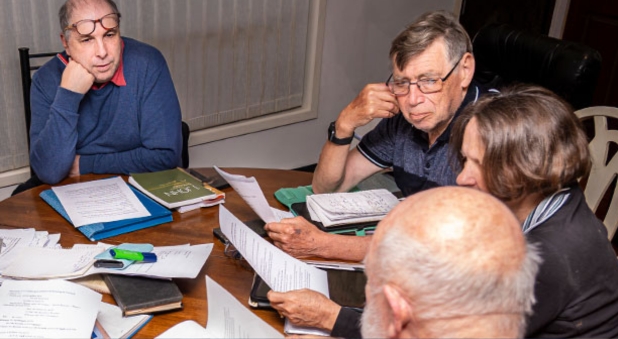Ever found yourself wondering why versions of the New Testament differ when translating the same Greek words into English? And what it felt like for members of the first churches to have the spiritual lights switched as they read a letter from one of the apostles?
These are some of the things that have brought a group of keen learners together, from different congregations at Lower Mountains Anglican Parish, to study New Testament Greek.
“To actually see something the way it was originally written down is quite inspirational – going back to the source,” says Don Taylor, who attends the class each week with his wife Glen.
“It can be challenging, because you say, ‘Why has [the writer] chosen this word?’ It’s a word only used six times in the New Testament; five times it’s got a particular connotation, and the sixth time it’s a different connotation, and why is that the case?
“It’s not the translation; it’s the way it’s understood by the church. [By understanding the Greek] you see challenges that you weren’t aware of before. “It’s so interesting.”
The classes are led by fellow parish member David McKay, a former high school music teacher who also spent four years at Bible college in his youth. He loved learning the biblical languages so much he has kept up his Greek reading ever since, and wondered if sharing some of this might interest others at his church.
It did. The class began early last year, and while some found it heavy going and dropped out, eight people still meet each Monday night in Mr McKay’s home. “Those who’ve remained all had some background in learning a language before, which does make it a little easier in some ways,” he says.
“We began with learning the characters and a few very common words, then had a go at reading from the beginning of John and the beginning of Mark – those are quite accessible and easy to read – and then we learnt a little bit of grammar. This year we’re using a 1 John reader linked to a second-year Greek book.
“I can see my students are making progress when they discover I’ve made some mistakes! You feel bad about making the mistake, but it can actually be a teaching moment.”
After more than a year of learning, Mr Taylor not only feels the class is enhancing his understanding of Scripture, but says with a chuckle, “I’m a bit more sympathetic now to the challenge of translating the Bible!”
Adds Mrs Taylor: “I’m really interested in translations of the Bible... and why the words are translated differently. I’m finding learning the Greek is helpful for that because the words don’t translate one-for-one. There are words in Greek that we don’t have a corresponding word for in English.
“I like being part of a class and learning together. I like spending more time looking at the Bible in a different context – and we are definitely spending more time with the Bible than we would be otherwise.”
For those encouraged to have a go at learning Greek themselves, or with a group in their church, Mr McKay suggests a new course called Greek Word Studies for Everyone, or the “Daily Dose of Greek” found online.
“We can really enrich our understanding of the Bible through reading it in the original languages – and I think it’s good to have people in our churches who’ve done some study that helps them with that,” he says.
“A lot of people would think that we don’t need to do it because it’s all been done for us. Scholars have given us very good English translations, and we’ve got so many. But it is very good to see it for yourself – a bit like the Bereans in Acts!”




























